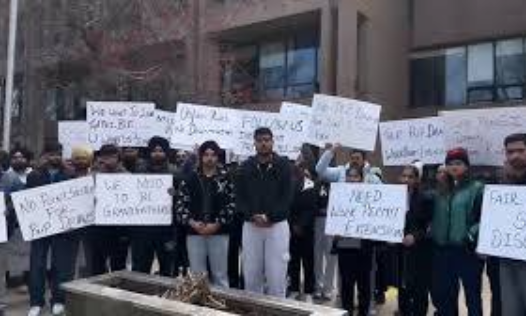Payment is being processed. Please do not refresh or close this page until your payment is complete.
 Book an Appointment
Book an Appointment

More than 70,000 international student graduates in Canada are grappling with the possibility of deportation following recent federal immigration policy changes.
These students, who arrived in the country with aspirations of establishing a new life, have taken to the streets in protests against the Justin Trudeau government's decision to restrict study permits and decrease permanent residency nominations.
Students are protesting nationwide, with students setting up encampments and organising rallies in various provinces, including Prince Edward Island (PEI), Ontario, Manitoba, and British Columbia.
In PEI, frustration has boiled over, with hundreds of students rallying outside the legislative assembly for over three months, voicing their opposition to the shifting immigration landscape.
Adding to the urgency of the situation, representatives from the Naujawan Support Network, a student advocacy organisation, have warned that many graduates may face deportation as their work permits expire by the end of the year.
New provincial policies have also contributed to this dilemma by cutting permanent residency nominations by 25 percent, leaving numerous students in precarious positions.
"I spent six years taking risks to come to Canada. I studied, worked, paid taxes, and earned enough Comprehensive Ranking System (CRS) points, but the government has taken advantage of us," said Mehakdeep Singh, a former international student now facing deportation.
- To manage the influx of international students, which accounted for 37 percent of study visa holders in 2023, the Canadian government has implemented a cap on new study permit applications.
- This new limitation is expected to result in roughly 360,000 approved study permits in 2024, representing a 35 percent decrease from the previous year.
Marc Miller, Minister of Immigration, Refugees and Citizenship, announced that foreign nationals might no longer apply for a post-graduation work permit (PGWP) at the border, a measure targeting what is known as "flagpole," where temporary residents exit and re-enter Canada to expedite their permit applications.
In response to these challenges, Canadian Prime Minister Justin Trudeau recently declared plans to reduce the number of temporary foreign workers employed in low-wage jobs.
In Brampton, the discussions have further heated up, with hundreds of international students rallying against their portrayal as the culprits behind local housing and job shortages.
Advocacy organisations, such as the International Sikh Student Organisation, assert that broader policy failures are the root cause of the issues rather than the presence of international students.
Source : https://www.msn.com/en-in/money/topstories/govt-has-taken-advantage-of-us-indian-students-as-graduates-in-canada-face-deportation-post-work-permit-denials/ar-AA1pvVyJ?ocid=hpmsn&cvid=3de734d78e904422a0d71a19ef6b977c&ei=14